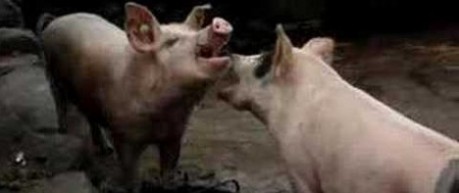Tuesday 5th November 2019, 2:15pm
Better understanding of the social and genetic factors linked to harmful aggressive behaviour in pig pens could lead to improved management.

A novel method of studying farmed pigs’ behaviour is aimed at minimising aggression that can occur whenever pigs are introduced in shared pens.
Research into the complex social networks formed by groups of pigs that are housed together will be used to inform ways to minimise aggressive interactions.
Researchers are using social network analysis to gain new insights into how interactions that occur when pigs are mixed with one another affect harmful behaviour.
Scientists aim to characterise structures of social interaction in pig pens that lead to minimal injuries from fighting.
By identifying the roles of individuals in relation to one another and how they impact on each other, researchers hope to find a new set of characteristic traits to target for minimising hostile interactions.
Their results could improve health and welfare for pigs and lead to better productivity for farmers.
The study builds on previous research showing that social interactions that occur within the first 24 hours of pigs being housed together can indicate how relationships are likely to develop over the few weeks that follow.
The insights, published in the journal PLoS One, showed that pigs that fought on first meeting but quickly settled into a large clique were less aggressive in the long-term.
Conversely, pigs that did not interact on first meeting, but later settled into groups of smaller clusters, showed more aggression in the long term.
The research, carried out in collaboration with Scotland’s Rural College and Teagasc, has received support from the Teagasc Walsh Fellowship Scheme.
"By applying mathematical analyses of social networks to detailed data of individuals’ behaviour, we hope to gain insights that will inform farming practices to minimise aggression in pig pens."
Professor Andrea Doeschl-Wilson, The Roslin InstituteSource: The Roslin Institute